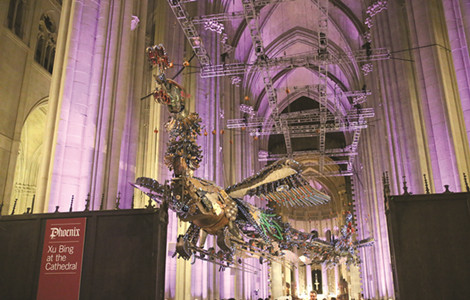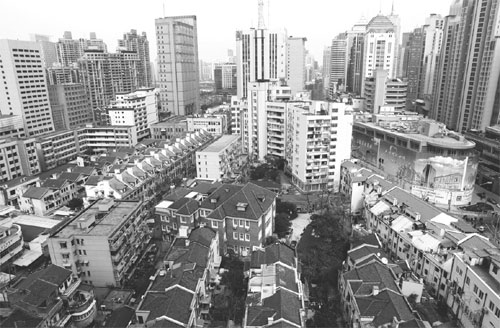China's fire-protection law needs to be enforced
Updated: 2015-02-27 11:25
By Li Yang in Shanghai(China Daily USA)
|
|||||||||
|
The high-rise buildings in Shanghai are vulnerable to fires. Gao Erqiang / for China Daily |
One of the world's tallest apartment building, the 86 Torch tower in Dubai, the United Arab Emirates, caught fire last weekend as high winds from a sandstorm fanned the flames.
About 100 firefighters prevented the fire on Feb 21 from spreading in the tower where more than 2,000 people live. Three hours after it started, the blaze was put out mainly by internal firefighting facilities. Thanks to the building's fire- safety systems and evacuation protocols, nobody was killed.
Dubai is famous for its fire-protection standards in high buildings, and regular firefighting training for residents. High-rise apartment buildings are allowed only electricity, not natural gas for cooking and heating.
The successful firefighting and zero death toll in Dubai this time should serve as a lesson for Chinese people, who are accustomed, if not numbed, to large death tolls in big fires.
A fire in a sweatshop factory in Kunshan, Jiangsu province, on Aug 4 last year claimed 71 lives. A fire in a food processing factory in Shouguang county, Shandong province, on Nov 16 last year killed 18 workers. A fire in a market in Harbin, Heilongjiang province, early last month burned more than 20 hours and killed five firefighters. A fire at a 28-story apartment building in Shanghai's Jing'an district killed 58 residents on Nov 15, 2010. The casualty list goes on.
In such events, several local government officials in charge of safety would receive administrative punishment, or be dismissed at worst. Businessmen in charge of a factory or the director of a workshop become the main scapegoats. The public also seems satisfied with the penalty, and gradually takes it for granted that when a big fire happens there must be a heavy loss of life.
China has a good fire protection law, a number of firefighting rules, a big fire- department system, as well as shameful record of big loss of life in fires, because the law, the rules and the system always fail at the same time. To some extent, many fires were avoidable and many lives should not have been lost.
But China almost fails in all the places where Dubai succeeds. Fire engine accesses are blocked by private cars or illegal construction. Escape tunnels are locked or clogged. Many people do not know how to use the limited fire-extinguishing installations, and there is a lack basic knowledge on how to escape from fires. Flammable materials are widely used in high buildings.
Fire inspections have become a cash cow for fire departments in many places, with officials taking bribes from construction companies or business owners. In return, the bribers can save a lot of money that should have been spent on fire-extinguishing installations or more expensive fireproof building materials. It is the same case with China's environmental protection effort. Environmental watchdogs live on polluters' bribes, helping them save money that should have been used for pollution-treatment facilities.
People's awareness about fire protection is poor. Although many schools teach students how to escape fires, few of young people, including the teachers, take it seriously because it's not a course that can send students to better colleges.
Local governments are invariably fans of high-rise buildings, which are seen as symbols of modernity and prosperity. By 2012, the number of skyscrapers above 152 meters in China was comparable to the United States. And more than half of the high-rise buildings under construction in the world are in China. The real estate bubble saw the rapid expansion of buildings in China. But the construction quality is poor, as proven by several earthquakes in recent years.
Many well-preserved ancient villages and towns, built with bricks and wood, in China have good fire-protection designs, fire-extinguishing installations and broad escape tunnels. That's a major reason why they survive hundreds of years. When these designs, installations and facilities are removed to create more space for shops and modern kitchens in commercial buildings, the old towns become increasingly immune to fires, especially under heavy pressure from the huge number of tourists. In the past two years, at least three ancient towns in Yunnan and Hunan have been burned to ashes.
Many fires are not accidents, but man-made disasters. Making its fire-protection law real is the very first step for China to prevent such disasters.

 Phoenix landing
Phoenix landing
 Inside a Taobao village
Inside a Taobao village
 Testing mettle: Students appear for art college exam
Testing mettle: Students appear for art college exam
 Top 10 best-selling SUVs in Chinese mainland in 2014
Top 10 best-selling SUVs in Chinese mainland in 2014
 The eighth nine days: wild geese are flying back
The eighth nine days: wild geese are flying back
 China's biggest Akhal-Teke horse base
China's biggest Akhal-Teke horse base
 Chengdu citizens visit Du Fu Thatched Cottage to mark Human Day
Chengdu citizens visit Du Fu Thatched Cottage to mark Human Day
 Tencent gifts red envelopes to employees
Tencent gifts red envelopes to employees
Most Viewed
Editor's Picks

|

|

|

|

|

|
Today's Top News
Yuan on move, but not to top
EB-5 could harbor fraud: report
US Rep requests Lunar New Year honors
Shanghai tops China's disposable income list
Hainan expands US non-stops
Google upbeat about reentering China: Forbes
China investors top US list of 2013 national security reviews
China, US work to make Xi's visit successful
US Weekly

|

|









